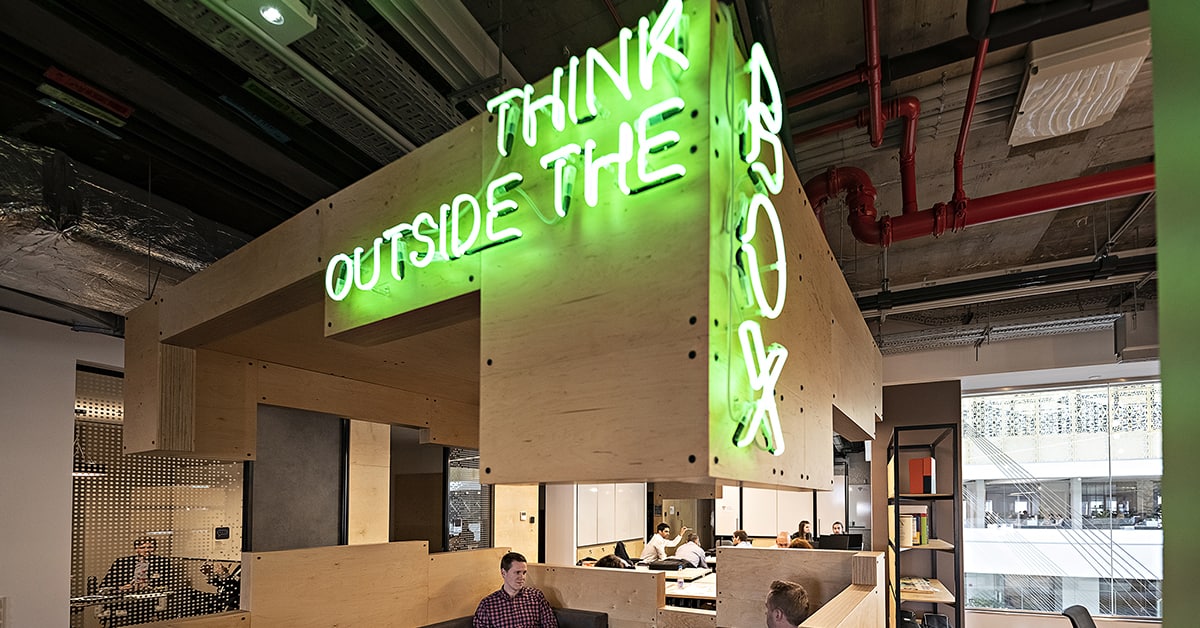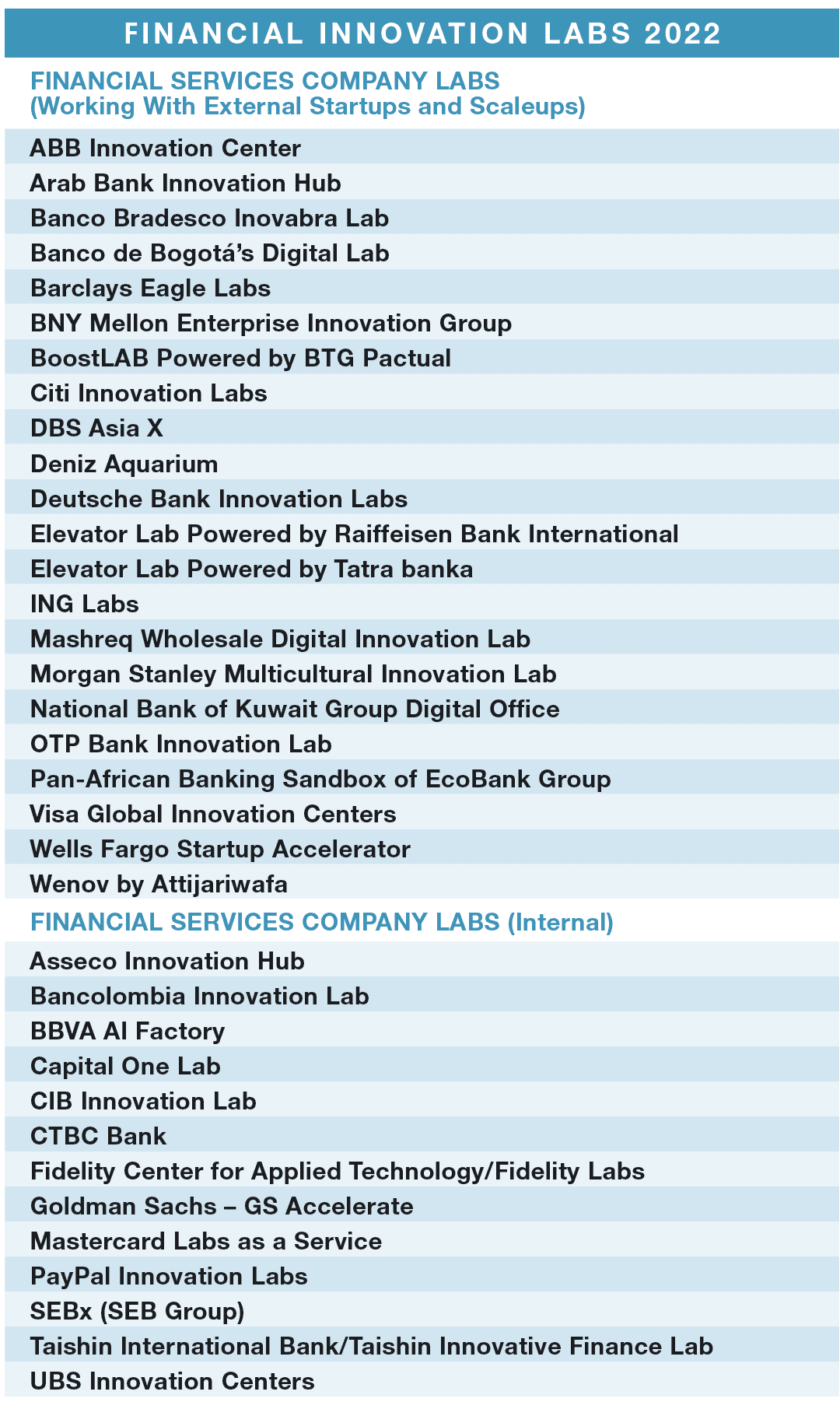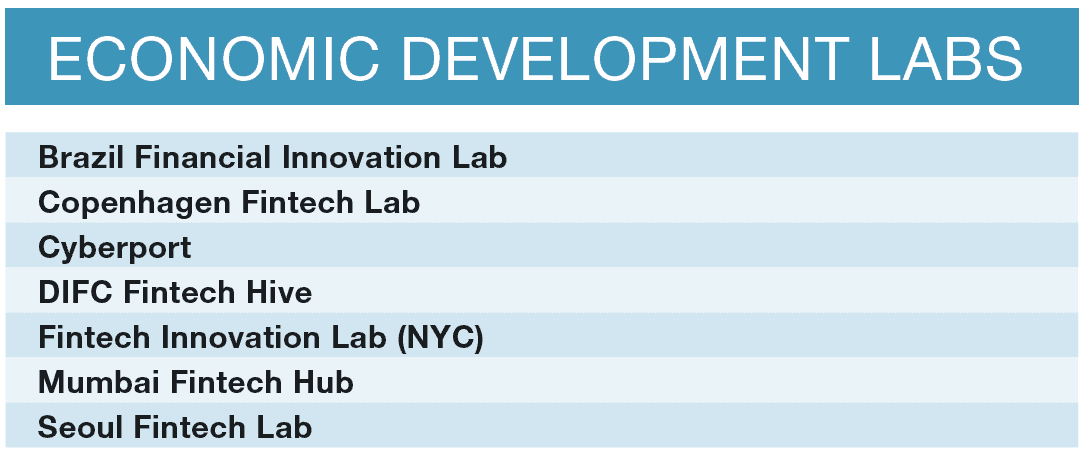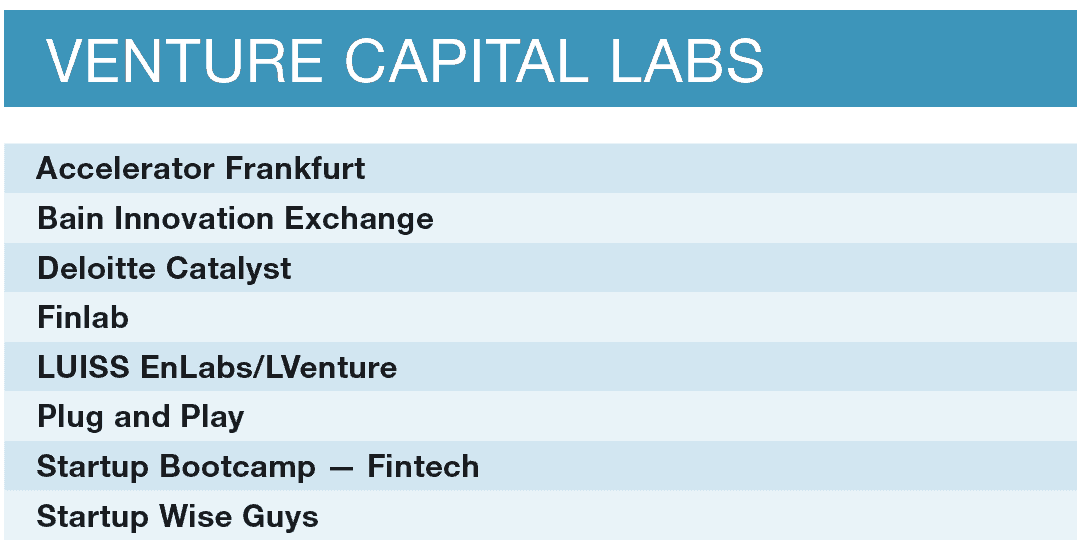The best labs bring people together to spark fresh thinking.

How innovative are you?
Hans Brown, global head of Enterprise Innovation for BNY Mellon, wants to know. He’s betting that whether you lead cryptocurrency efforts at your bank or just write lines of credit, you’re more innovative than you give yourself credit for. That’s why IdeaWorks is a key component of the BNY Mellon Enterprise Innovation group. The program seeks to crowdsource ideas from within the bank to drive innovation. Over two weeks, employees develop ideas of how to transform BNY Mellon processes. Employees vote on their favorite concepts. The bank builds the best.
The ever-faster pace of technology coupled with Covid-19 generated expectations for digital experiences have prodded the notable fintech hubs, labs, incubators and accelerators examined by Global Finance to seek innovation wherever they can find it. They look internally, through relationships with outside startups, or—as in the case of the BNY Mellon Enterprise Innovation group—through some combination of both.
“Our mission is to accelerate innovation through collaboration and make sure it happens everywhere—not just within the realm of a special few people,” Brown says. “We’re trying to harness our collective capabilities to find new ways of thinking; new ways of doing. This may be using data and insight in ways we haven’t before or connecting services in ways we haven’t before. IdeaWorks is a real cultural change. People have great ideas. Almost everybody can be an innovator. They just need the right processes and tools.”
Brown pointed to the last IdeaWorks challenge, in BNY Mellon’s Global Operations and Technology Division, with nearly 40% of division employees participating. Brown would like to see even wider participation as time passes: “We’re trying to create opportunities to energize everybody, to harness the collective capabilities of our entire organization. We want 15,000 innovators.”
Seeking innovation from as-yet-untapped minds is also critical to the Morgan Stanley Multicultural Innovation Lab. Now in its fifth year, the New York–based lab has thus far accelerated 59 companies. It is expanding to reach markets in Europe, the Middle East and Africa with the opening of a second lab, in London. The lab strives to spark innovation among startups headed by underserved populations—notably, women and people of color. Morgan Stanley believes that lack of funding for these companies represents more than $4 trillion in unrealized returns.
Selma Bueno, managing director and head of Multicultural Client Strategy at Morgan Stanley, believes the lab “clearly identified a funding gap. Data shows that there are a significant number of women founders and founders of color with insufficient capital,” to bring their ideas to market. “We think that’s a significant missed opportunity,” she says.
Morgan Stanley was among the first to create a lab focused on women and people of color. “It’s a highly curated experience, tailored to each founder,” says LaToya Wilson, executive director of Multicultural Client Strategy. “Every founder is different …There is no one-size-fits-all.” In general, services received by startups during their five-month tenure include leadership coaching, sales coaching, workshops and development of go-to-market strategies. Founders also can forge relationships with Morgan Stanley experts, with mentors—culled from senior Morgan Stanley staff—and others. Today, the companies accelerated have a combined valuation of more than $515 million, and have raised a combined $100 million since graduating.
“As the world digitalizes with nonfinancial retail experiences, the art of the possible becomes what people believe,” says Brown. “Covid-19 created a paradigm shift: how we create services; where we service. That’s accelerating the demand for new technological capabilities.”
Those capabilities are germinated in fintech labs around the world. This, Global Finance magazine’s fifth annual review of the world’s best financial innovation labs, showcases in detail a selection of these leading innovation centers.

|
BANK-SPONSORED LABS |
|---|
These bank-sponsored labs partner with tech startups to identify and develop fintech solutions for clients and the banks themselves.
Arab Bank Innovation Hub was founded in 2018 to accelerate development of disruptive technologies, with individual labs in Jordan, Egypt and the United Arab Emirates. Of its three main programs, AB Accelerator partners with startups–providing workspace, access to resources, meetings with decision makers across Arab Bank’s 20-country network and the chance to develop proofs of concept. Thus far, the accelerator has invested $2.8 million in seven startups. Products accelerated focus on buy-now-pay-later financing, cybersecurity and insurance. Additional proofs of concept are being developed in the fields of blockchain, credit scoring and AI.
Additional arms of the innovation hub focus on product development and internal innovation. Product development programs encourage employees throughout the bank to submit innovative banking ideas and spread awareness of new technologies that can shape the future of banking. One concrete outcome: Reflect, the first neobank in Jordan.
In São Paulo, Inovabra, sponsored by Banco Bradesco, is an innovation ecosystem offering internal entrepreneurship, international collaboration, a capital fund, an internal research team and a startup program forging strategic partnerships between the bank and fintech companies offering products or services applicable to bank needs. Thus far, the lab has nurtured more than 220 startups, developed more than 200 proofs of concepts and hosted more than 2,500 events. Products developed center on big data, blockchain, the Internet of Things and immersive computing. Innovations include Smarkets’ B2B supplier relationship platform, which uses AI to help with price negotiations.
Inovabra offers a 22,000-square-meter (236,800-square-foot) coworking space called inovabra habitat. Lab activities include mentoring and demo days. Investment is possible from the Inovabra Ventures proprietary equity fund, currently valued at 850 million Brazilian reais (about $168 million). So far, the fund has invested roughly 366 million reais in 14 startups. A virtual version of the lab gathers companies from all over Brazil to probe opportunities within Banco Bradesco and its partner companies; more than 2,600 startups have registered.
Beginning life in 2017 as an internal lab, Banco de Bogotá’s Digital Lab now partners with outside fintechs to strengthen the Colombian banking system and devise new solutions for clients. The bank launched the lab with 30 employees, and now boasts an internal staff of about 460 (with 100 new hires in the past year alone), focusing on digital innovation as a lever for growth and improved customer experiences.
The lab produced a completely digital savings account, the first of its kind in the country and part of the bank’s effort to become a digital-only institution. In 2021, it sold more than 1.5 million products through digital channels, a 79% increase year-over-year. Currently, 80% of credit card and 85% of personal loan issuances are made digitally.
Lab partnerships include a relationship with SoyYo, a fintech deploying biometrics to improve authentication of customers; Mareigua for authenticating processes and approving conversion rates for new clients; and Buda, a company enabling residents of Latin America to invest in the worldwide cryptocurrency market.
In addition to IdeaWorks, the new BNY Mellon Accelerator Program is quickly becoming an important part of BNY Mellon Enterprise Innovation Group. The accelerator was founded in 2021; graduation of its first cohort and arrival of its second was announced in April. With offices in New York, London and Singapore, the accelerator program seeks emerging tech companies that can help the bank meet specific challenges.
“We are very deliberate in the accelerator program,” Brown says. “Everything created focuses on a real business problem that we need to solve. It’s not, ‘Here’s a solution, let me run around looking for a problem.’ Rather, it’s a matter of, ‘Here’s a problem we have, or one of our clients has. How do you solve it?’”
Companies selected for the accelerator have up to six months to build a proof of concept with measurable results. Successful participants become BNY Mellon strategic collaborators or vendors. A venture capital (VC) advisory board helps with investments, while express processes for risk assessment aid the bank in quickly bringing new technologies into its ecosystem.
The impetus for forming an accelerator was simple. “Working with the most cutting-edge technological startups in the world helps us innovate faster,” Brown says.
Innovations multiplied, including the BondIT algorithm-driven, fixed-income portfolio optimization solution. It provides financial advisories with real-time, end-to-end processes to determine pricing and optimize portfolios at scale.
The Citi Accelerator program is a key component of Citi Innovation Labs, an organization devoted to delivering cutting-edge technological solutions to Citi’s institutional clients. Citi Accelerator offers startups a four-month program during which they are mentored by key Citi decision-makers. The program is designed to develop startups’ understanding of how to shape their products to meet the needs of large organizations. Program participants work in Citi Innovation Labs. Thus far, the accelerator has graduated more than 120 startups, which raised more than $2 billion from Citi and other investors. Recent innovations from the accelerator include a platform to expedite the adoption of blockchain technology.
Hosted by DBS Bank, DBS Asia X (DAX) is one of Singapore’s largest innovation centers. In its 16,000-square-foot coworking space, DBS employees, startups and the broader fintech community come together to innovate. Its Startup Xchange program matches startups with project teams that focus on emerging technologies. In 2021, startups in the Xchange developed six successful proofs of concept. Since the start of Covid-19, DAX provided virtual workshops and live streaming of forecasting sessions and planning sessions. New for 2021 was the development of DAX’s Deep Xperts program. Through this program, more than 100 senior DBS employees—expert in domains such as consumer finance, secured lending, digital banking, blockchain, AI, the Internet of Things and 5G—are matched with industry experts from big tech to improve the bank’s technology.
Deniz Aquarium is the innovation and entrepreneurship arm of Neohub, a subsidiary of Istanbul’s DenizBank. It supports both in-house entrepreneurs and outside startups. The lab’s Startup Acceleration Program provides companies with office space and support for rapid growth, identifying the needs and shortcoming of each startup and deploying expert mentors to help with product development. Unlike most innovation labs, which accept new startups at set times throughout the year, Deniz Aquarium is always open for applications. Startups accepted may join at any time. The lab has preemptive rights to buy up to a 15% share in each startup accelerated.
One significant product to come out of Deniz Aquarium is Midas, a commission-free digital stock brokerage platform enabling Turkish investors to trade shares on both the Turkish and US stock markets.
Elevator Lab Powered by Raiffeisen Bank International (RBI) is the largest fintech and startup program in Central and Eastern Europe. Its four-month Elevator Lab Partnership Program helps later-stage fintechs improve products and scale internationally. Thus far, it has fully funded 25 proofs of concept. This is an equity-free program, though investment is possible through Elevator Ventures, which supports early-stage and growth companies in fintech and related technologies.
Two additional facets are the Elevator Lab Bootcamp and Elevator Lab Challenge, both organized by RBI’s network banks. The Bootcamp focuses on early-stage startups, offering them expert help in developing minimum viable products. The Challenge provides local latter-stage startups with the possibility of pilot projects with local Raiffeisen banks.
Based in Slovakia, Elevator Lab powered by Tatra banka, a member of the RBI Group, is one of these regional efforts. It offers fintech startups the mentoring and education needed to scale their products and services. Startups work in conjunction with teams of bank programmers, designers, data analysts, market research experts and businesspeople. These teams strive to speed the development of the sorts of prototypes that can help the bank meet its digital goals. Innovations include products by Zentity to enable easy integration of third-party plugins for Tatra banka’s applications—including add-ons for food ordering, storing digital receipts and topping up telephone services. A second innovation is Premium API, helping business owners with invoicing and payment reconciliation.
In operation since 2016, the mission of ING Labs is to validate new businesses for ING and its clients. Businesses incubated focus on disruptive services for lending, trade, security, compliance, retail mortgages and improving consumers’ financial health. To develop and deploy these services, ING may either partner with an existing scaleup or form one of its own from among ING’s in-house talent pool.
The lab has four outposts: Brussels and London act as later-stage accelerators, scanning the market for major scaleups that offer products ING believes can help it and its clients. The lab then offers a one-year program to test products for commercial viability. Amsterdam and Singapore incubate earlier-stage startups. The four labs typically house between 20 and 30 ventures at a time. Funding comes from the €25 million ING Innovation Fund, devoted to accelerating innovation across the bank. Current products generated focus on machine learning and digital processes for meeting know-your-customer requirements.
Mashreq Bank’s Wholesale Digital Innovation Lab was instituted in 2020 with a cohort of five people, and has since scaled to 120, with an annual budget of $15 million. The lab actively partners with various accelerator programs (notably with Startupbootcamp) to make fintech investments—with more than 30 bootcamp graduates having thus far received Mashreq funds.
The Mashreq lab’s goals are to build and deploy predictive analytics in support of client growth and cost reduction; provide corporate clients with a rich, digital-first user experience; and to build next-generation digital products, particularly in the fields of high-value payments and trade finance transactions.
Innovations from the lab include Pulse, an integrated relationship management platform for corporate banking staff that deploys analytics to help understand clients as people, augmenting sales and accelerating crediting decisions, and also provides frontline staff with a single platform for managing their work. A second lab focuses on retail banking.
Morgan Stanley’s Selma Bueno calls the Morgan Stanley Multicultural Innovation Lab “an intensive Ph.D. program in being a startup.” But while learning is great, so is cash. The New York-based lab also provides startups—typically in the post-seed to Series B rounds of funding—with $250,000. (Those participating in the London lab, for the EMEA region, will receive £200,000.)
The program is proving increasingly popular: Wilson says that more than 500 companies applied for the most recent session. Morgan Stanley accepted 10. The EMEA accelerator will accept only five.
Fintech innovations recently arising from the Morgan Stanley lab include Zirtue and Stimulus. Zirtue is a relationship-based lending application that streamlines and formalizes loans among friends and family. Stimulus is a purchasing platform that uses data and analytics on vendor demographics, aiding decision-makers who want more cultures represented among the companies with which they do business.
The National Bank of Kuwait Group Digital Office was launched in 2018 to accelerate digital transformation across the bank. Group Digital Office staff forge partnerships with outside fintechs to improve and enrich the bank, scouting fintechs and matching them to bank stakeholders with high-level technical requirements. NBK’s investment arm, NBK Capital, finances startups, investing about $10 million annually in these companies.
Innovations nurtured by the Group Digital Office include Weyay Bank, the first fully digital bank in Kuwait. Additional programs include the NBK Online Hackathon, a partnership with Coded Academy, to help generated new ideas for mobile banking. Twenty-five teams of fintech programmers competed in the last hackathon. In 2021, the Group Digital Office also established a design center focused on the user experience.
In Hungary, OTP Lab, launched in 2017, acts as the innovation hub of OTP Group. At its heart is the OTP Startup Partner Program, an international operation giving scaleups and later-stage startups a chance to build relationships with OTP. This is a nonequity program with no guaranteed funding. However, the lab works closely with OTP Group’s VC arm, PortfoLion, which invests in innovative entities. Lab partners include Amazon Web Services, Mastercard and Microsoft. In 2021, the lab incubated 15 companies. Over a three-month period, these startups develop pilots, and on demo day, certain fintechs are chosen to work with the bank. New for 2021 was the establishment of the lab’s venture-building arm.
The Bulgarian company Appraiser.ai is a recent graduate. The company uses the latest AI and machine learning technologies to deliver insights to the mortgage market, then automate valuation models for customers.
Wenov by Attijariwafa, founded in 2019, is an innovation lab with several arms. These include Smart Up & Ideation, an internal program enabling bank employees to carry out innovative projects; and WeDesign, which strives to imagine the digital banking experience of tomorrow. But the heart of Wenov is WeLab, an innovation lab that works with outside startups, offering the coworking space and guidance needed to accelerate time-to-market for fintech products. Funding is available through two investment companies created by Attijariwafa, and through Attijariwafa’s partnerships. Attijariwafa investments in companies nurtured typically run between €200,000 and €3 million.
In 2021, Wenov interacted with more than 120 startups, with 30 taking part in WeLab. Products included robotrading and real-time AI solutions to provide customer insight Chatbots aren’t new, but Moroccan language presents particular challenges. “What most people speak here is more of a dialect than a language,” says Mohamed Moullouze, Attijariwafa chief innovation officer. “It’s a mix of Berber, Arabic, French and English. Most AI and natural-language processing technologies are based on structured languages—English, for example, or French.” Working with startup AIOX Labs, Attijariwafa was able to deploy a Smart Customer Listening platform to support real-time decision-making based on the language of the customer.
Startups also take part in Wenov’s Fintech Catalyst and WeLab Boost offerings. Fintech Catalyst is an open innovation program through which the bank identifies its own challenges and use cases, then seeks out fintechs to solve them. Fintech Catalyst ran 12 challenges over the last year, with roughly 100 fintechs taking part. A dozen were chosen to develop proofs of concept, then seven were selected for ongoing relationships with Attijariwafa.
WeLab Boost gives the bank the opportunity to better understand and consider technological innovations—such as AI, blockchain, nonfungible tokens, the metaverse—and the benefits they may bring to Attijariwafa. Outside fintechs and others are invited to the bank to display their latest technologies. Based on the innovations seen and their potential benefits to the bank, Attijariwafa may choose to work with some of these startups.

|
ECONOMIC DEVELOPMENT LABS |
|---|
Finding that fintech innovation can bring value to entire communities, innovation labs have been launched by governmental organizations, NGOs, universities and others across the globe.
Created in 2017, the Financial Innovation Laboratory of Brazil is an initiative of the Brazilian Development Association, the Inter-American Development Bank and the Brazilian Securities and Exchange Commission, later joined by the Deutsche Gesellschaft für Internationale Zusammenarbeit international development and education organization. It acts as a think tank, promoting cooperation among more than 265 public and private entities, with the goal of stimulating financial innovation and sustainability in Brazil. Participants range from government ministries to financial institutions, nongovernmental organizations (NGOs), universities and fintechs. It facilitates more than 500 meetings each year among these entities. The lab produces and disseminates information, proposes regulatory improvements and pilots innovative new products. All publications, webinars and suggested regulatory changes are made available to the public for free.
Fintech is one of the lab’s four working groups. Others include Green Finance and Finance for Social Impact Investments. Of the roughly 265 lab members, 40 are startups working with the lab to strengthen innovation in financial and capital markets. Agenda items include implementation of tokenized securities and sustainability-focused fintech.
One of the lab’s significant objectives is to help banks meet sustainability goals aligned with the Paris Agreement, says Gabriela Goulart, an economist working with the lab. The lab also created fintech and regulatory sandboxes, an approach enabling the live testing of new services in a limited way before rolling out innovations to the broader ecosystem. “One of the benefits is enabling regulation to become more accepting of innovation,” says Gabriel Porto, a fintech consultant working with the lab.
The Seoul metropolitan government in 2018 launched the tri-part Seoul Fintech Lab. Its Global Fintech lab offers customized programs to foster fintech startups that wish to reach a global market. Fintech Hub provides fintechs with opportunities for collaboration with banks, VC firms, other investment institutions and private corporations. Finally, the lab’s Fintech Network develops policies with institutions and policymaking agencies to create a healthy fintech ecosystem in South Korea.
The Global lab’s staff of nearly 1,400 serves fintechs less than seven years old, and has thus far nurtured 140 companies. The program provides fintechs with workspace for up to three years, along with sandbox computing, consulting services, demo days, investor relations days, B2B matching programs and marketing. No direct funding is offered, but startups can obtain investment through the lab’s relationships with the Korea Credit Guarantee Fund and others in its ecosystem.
Part of the Dubai International Financial Centre, DIFC Fintech Hive accelerates fintechs, insurtechs and regtechs. In 2021, Amazon launched its own fintech lab at DIFC, focusing on innovative digital payments.

|
VENTURE CAPITAL LABS |
|---|
Venture capital firms and consultancies understand the value of fintech innovation. They therefore host a variety of fintech labs.
Rome’s LUISS EnLabs is an accelerator run as part of the Hub LVenture Group lab. Operated by the publicly listed LVenture Group in conjunction with Luiss Guido Carli University, it provides early-stage startups with an immersive program including coworking space, mentoring, management, direct investment and opportunities for investor networking.
At Deloitte, an internal lab called Catalyst operates in the US and Israel. Catalyst consists of Deloitte innovation teams devising fintech solutions for the company’s institutional clients. Deloitte also hosts an external fintech accelerator in London, offering funding in exchange for equity stakes.
Bain Innovation Exchange professionals work with a network of established businesses, startups, venture funds and entrepreneurs to build, launch and scale disruptive new business products.
Based in New York, Synechron is an IT and consulting company with fintech acceleration programs across the globe.
Accelerator Frankfurt is a VC and private-equity firm offering a three-month, go-to-market program for B2B fintechs, insurtechs and other companies. The accelerator offers startups mentorship, coworking space, strategy and legal consulting, and marketing.
Also significant is Plug and Play, based in Sunnyvale, California. With dozens of locations worldwide, Plug and Play bills itself as the world’s largest startup accelerator and Silicon Valley’s most active VC investor, nurturing more than 2,000 startups since 2006. Accelerated companies operate in 20 different categories, ranging from financial services to agriculture and travel. Its three-month fintech program runs twice a year and connects startups with the needs of financial institutions.

|
INDEPENDENT LABS |
|---|
These innovation centers are unaligned with banks, VC firms or economic development organizations.
With offices in Lisbon and São Paulo, Beta-i helps new and established businesses grow by offering innovation services in the fields of acceleration, corporate innovation and education. It runs Lisbon Challenge, one of Europe’s most active startup accelerators. Beta-i also supports a fintech-only program called the SIBS Payforward Accelerator.
MassChallenge is a 501(c) accelerator supporting early-stage startups with a four-month program of mentorship, training, office space, legal advice and access to funding. More than $1 million is doled out each year to top startups, no equity stakes required. It accelerates companies in nine different fields, including fintech.
TechQuartier, based in Frankfurt, caters to fintechs and other types of startups. (More than 40% of its 350 alumni startups work in fintech.) TechQuartier’s broad partner ecosystem includes Visa, ING, IBM and Deutsche Bank.



